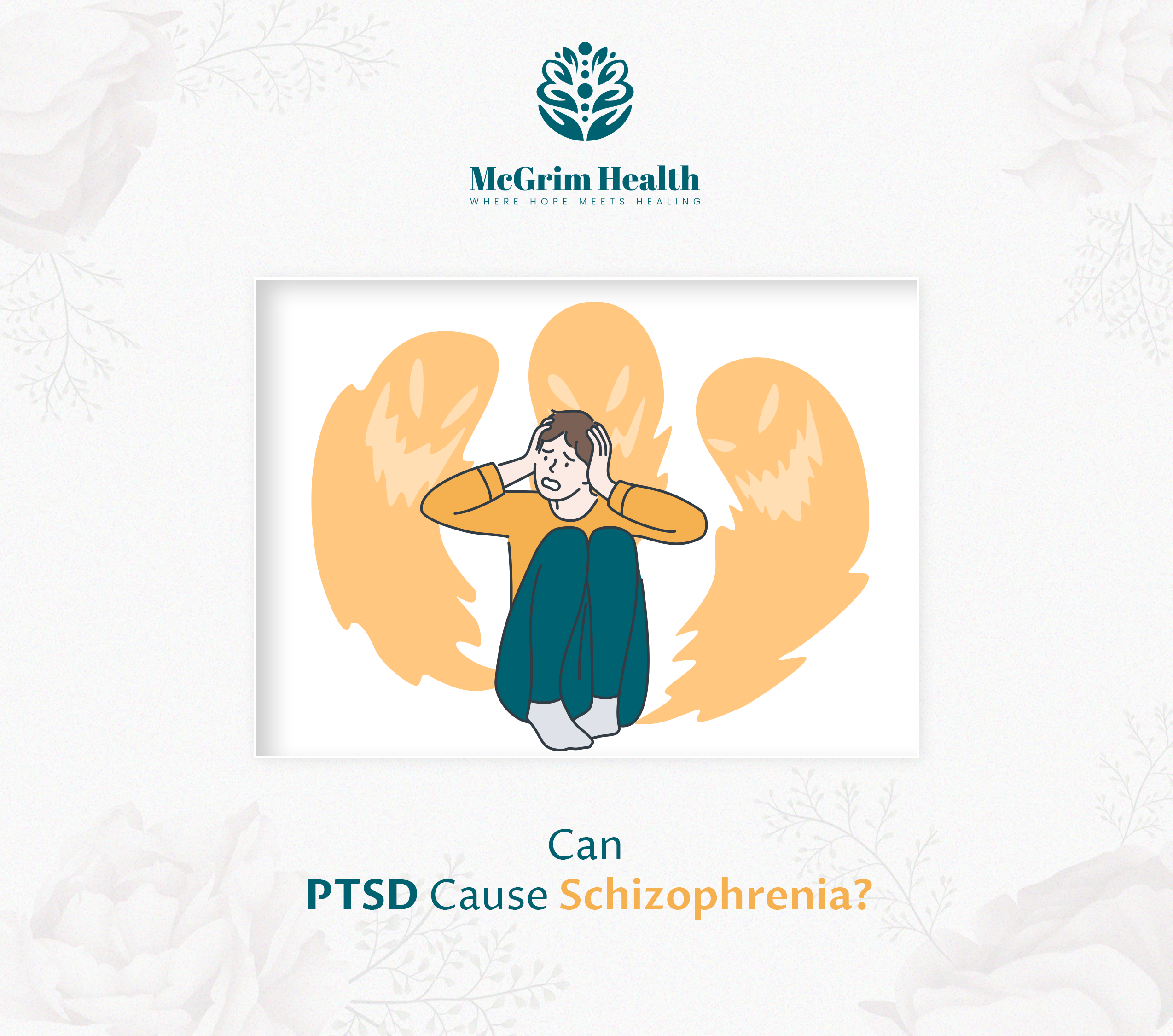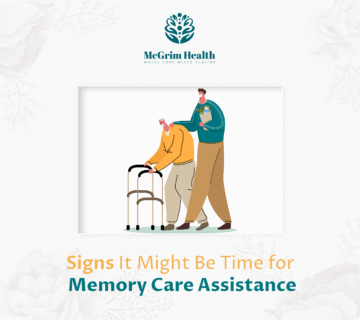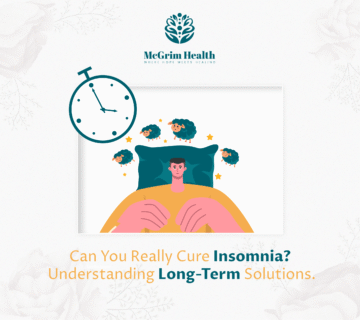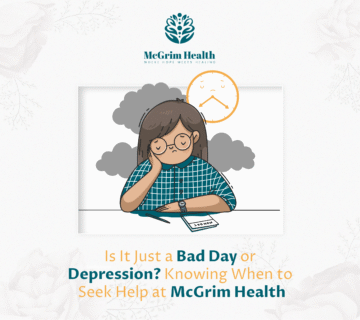Many people ask, Can PTSD cause schizophrenia? It’s a question doctors and researchers still study today. PTSD and schizophrenia are both serious mental health problems. But they are not the same.
Recognizing the link between PTSD and schizophrenia supports mental health caregivers, medical staff, and those influenced by trauma.
The management of PTSD and schizophrenia proves very difficult to handle. McGrim Health assists with tissue-imaginal trauma and schizophrenia management. Contact our team to receive tailored assistance for dealing with these conditions.
Below, will explain how these two conditions are different, how they may connect, and if one can lead to the other.
Understanding PTSD
PTSD serves as a psychiatric condition that impacts people who either survive or observe traumatic situations. Such events include exposure to:
- Combat
- Physical violence
- Sexual violence
- Traumatic events from childhood
- Natural disasters
- Serious accidents
The National Center for PTSD reports that approximately six people out of a hundred experience PTSD in the United States. People who do not correctly manage their unresolved traumatic experiences will develop post-traumatic stress psychosis, showing symptoms similar to schizophrenia.
Symptoms of PTSD Include:
- Flashbacks and nightmares
- Avoiding reminders of trauma
- Feeling guilty, ashamed, or detached
- Being irritable, having trouble sleeping, and being on high alert
Research findings prove that PTSD patients tend to experience hallucinations in PTSD-related voices more frequently than initially thought, thus driving extra examinations into the difference between PTSD and schizophrenia.
What Is Schizophrenia?
Schizophrenia warps reality. It usually begins between 16 and 24. This severe disorder reshapes thoughts, behavior, and feelings. It can turn life into a storm of confusion.
Main signs of schizophrenia:
- Delusions (false beliefs independent of actual evidence)
- Hallucinations, like hearing voices
- Disorganization of thinking and speech
- Negative symptoms like ambivalence or lack of emotional responsiveness
- Mental deterioration hurts task management and working memory.
Schizophrenia affects 1% of people worldwide, causing personal and work life challenges.
Shared Risk Factors Between PTSD and Schizophrenia
Several risk elements exist between PTSD and schizophrenia as independent disorders, yet they can co-occur in their combined appearance.
- Early life trauma and abuse
- Genetic predisposition to mental illness
- Substance abuse
- Socioeconomic instability
- Chronic stress and social adversity
Risk factors can overlap, making diagnosis tricky and sometimes resulting in two diagnoses at once.
Can PTSD Cause Schizophrenia?
PTSD does not directly cause schizophrenia. But in some people who are already at risk, a very bad or scary event (called trauma) can lead to symptoms of schizophrenia.
How PTSD and Schizophrenia Are Linked
-
Stress Hormones (HPA Axis)
Trauma causes the human body to produce increased levels of stress hormones. These hormones can change parts of the brain that help with memory and decision-making.
-
Brain Chemicals (Dopamine)
PTSD and schizophrenia both affect brain chemicals, especially dopamine. This impacts mood and feelings.
-
Inflammation
Long-term stress triggers chemicals in the body, leading to hallucinations. It can also accelerate schizophrenia in those already prone to it.
Post-Traumatic Stress Psychosis vs. Schizophrenia
The patients with PTSD will sometimes tend to have a vivid imagination or hear things that don’t exist. It doesn’t always mean that they have schizophrenia. The disorders falling under post-traumatic stress psychosis may include:
- Voices that arise as a result of trauma
- Very scared or expects something evil to happen
- Dissociation and derealization
It is important to identify the distinction between PTSD plus psychosis and schizophrenia, as both demand unique management.
Does Trauma Increase the Risk of Schizophrenia?
Research from Schizophrenia Bulletin demonstrates that persons experiencing childhood trauma develop psychotic disorders as adults at a rate 3 or 4 times higher than others.
So, can schizophrenia be caused by childhood trauma? Proof exists that childhood trauma leads to schizophrenia. People with genetic risks for schizophrenia face a much higher chance of developing it if they go through a lot of stress.
Co-occurrence of PTSD and Schizophrenia
12% to 30% of schizophrenia cases may involve a dual diagnosis of PTSD.
This dual condition presents distinct hurdles, including:
- A higher chance of suicide
- Trouble getting better with treatment
- Problems with making friends and fitting in
- Going to the hospital more often
Patients with both PTSD and schizophrenia need integrated treatment plans. These plans should address trauma and psychosis at the same time.
Differentiating Symptoms: PTSD vs. Schizophrenia
| Symptom | PTSD | Schizophrenia |
| Hallucinations | Rare trauma-related voices | Frequent, unrelated content |
| Flashbacks | Common | Rare |
| Paranoia | Based on real trauma | Bizarre, unfounded beliefs |
| Avoidance | Trauma-specific | General social withdrawal |
| Emotional blunting | Less common | Very common |
A correct diagnosis comes from a psychiatric evaluation, collecting patient history, and observing the patient over time. Understanding the PTSD vs schizophrenia symptoms helps avoid misdiagnosis and ensures proper care.
Treatment Considerations for Co-occurring PTSD and Schizophrenia
Treating someone with PTSD and schizophrenia requires a team. Here’s how they help:
Medicine
- Antipsychotics for schizophrenia
- SSRIs or SNRIs for PTSD
- Mindful of Benzodiazepines, which could worsen psychotic symptoms
Talk Therapy
- CBT specializes in psychosis and trauma
- Eye Movement Desensitization and Reprocessing (EMDR) for trauma treatment
- It also teaches ways to stay calm and manage emotions
Team Care
- A team of doctors, therapists, and case managers works together
- They understand the person’s past trauma
- Families help support the person, too
Prevention and Early Intervention
We can help stop schizophrenia from starting in people who have been through trauma by:
- Finding kids and teens who may be at risk
- Giving them therapy that helps with trauma
- Making sure they have strong support from family and friends
Early trauma care could be a key step in preventing post-traumatic schizophrenia or other severe disorders from taking hold.
Final Thoughts
So, can PTSD cause schizophrenia? The answer to that is no. PTSD has no causative relationship to schizophrenia, but it is an essential point of differentiation in terms of trauma, change in the brain, and family history.
Doctors and caregivers must know the difference between PTSD and schizophrenia. Some symptoms appear similar, such as hearing things that do not exist or feeling alienated.
Knowing the differences helps people to obtain the right therapy.
FAQs
Can head trauma cause schizophrenia?
People who face brain injuries face an elevated chance of developing psychosis when their relatives have a history of psychotic disorder.
Does schizophrenia cause loss of appetite?
The condition has the power to modify appetite, resulting in body weight alterations. The drug effects or adverse symptoms generate the outcome.
Do people with PTSD hallucinate?
People dealing with PTSD frequently experience the perception of voices while also seeing scary images.





No comment